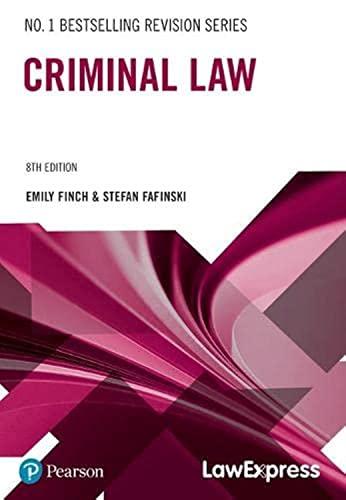Question
Will the offering need to be registered with the securities Exchange Commission (SEC) under the securities Act of 1933? Rule 507 seems like 1-5 million
Will the offering need to be registered with the securities Exchange Commission (SEC) under the securities Act of 1933?
Rule 507 seems like 1-5 million dollars would be an incredible number of $500 certificates in order to exclude either college/university from qualifying by rule 507. Do you know of any other examples of securities within a university or learning non-profit that would contribute to the total annual amount? I had a hard time looking up this information and upon reading in addition to the certificates what else would be a part of this total?
Reference:
Seaquist, G. (2012). Business law for managers[Electronic version]. Retrieved fromhttps://content.ashford.edu/book
Private University, a private nonprofit educational institution located in California, decides to issue "Shares in Learning" certificates in a one-time offering to the public. These shares will be sold for $500 each and entitle the bearer to redeem each certificate for two undergraduate or one graduate college credit in any of its schools at any time in the future. The shares may also be resold without restriction by the initial purchaser. The offering will be made via the Internet. Will the offering need to be registered with the Securities and Exchange Commission (SEC) under the Securities Act of 1933? Explain. Does your answer differ if "Shares in Learning" are issued by Private College, a proprietary for-profit institution that does business in all 50 states?
Will the offering need to be registered with the securities Exchange Commission (SEC) under the securities Act of 1933? According to the Federal law, any securities are registered before they can into the market ready to be sold. In this Congress established The Securities Act of 1933 in order to control security fraud which required issuers to disclose information that is used in order to make decisions on their investments. It is clear that there will not be a requirement or need for the offering to be registered. Navigating the way is the use of an exemption list which illustrates the securities which are exempt from registration. Securities offered by non-profit educational, government-offered securities, and bank along with savings and loan offered securities, along with bank securities that were sold prior to July 27, 1933 are exempt from registration as stated in Seaquist (2012). "Under rule 147 as laid out in Seaquist (2012) all securities offered for sale solely in one state by a company which offers at least 80% of its business in the state are exempt from filing" (pg. 31.1). Based on this private universities, non-profit, along with educational institutions that are in California are not required to register. A private college that is a proprietary, for-profit institution which operates its business in all 50 states there is several type rules which may assist the college because it's a onetime offering along with the private college putting their certificate up for sale for the public. Due to rule 507 of regulation D, a non-public issuer can sell as high as one million of securities in a twelve-month period as stated in Seaquist (2012) which instructs that the organization would not have to register its certificates. However, a private college does need to document the filing with the SEC, but no registration would be needed per regulation A for any nonpublic that issues can sell as high as five million of securities in a one-year period that has no limit on purchases as stated in Seaquist (2012). The purpose and advantage of the security exchanges is the ability to strategically and efficiently limit and ultimately prevent fraud as well as keep individual's and parties in businesses secure. The alternative for free reign and no oversight is a market easily and heavily manipulated. Unethical practices and a stronger less manipulated and fragile markets are proof that Government regulation in this are good for all individuals.
Step by Step Solution
There are 3 Steps involved in it
Step: 1

Get Instant Access to Expert-Tailored Solutions
See step-by-step solutions with expert insights and AI powered tools for academic success
Step: 2

Step: 3

Ace Your Homework with AI
Get the answers you need in no time with our AI-driven, step-by-step assistance
Get Started


